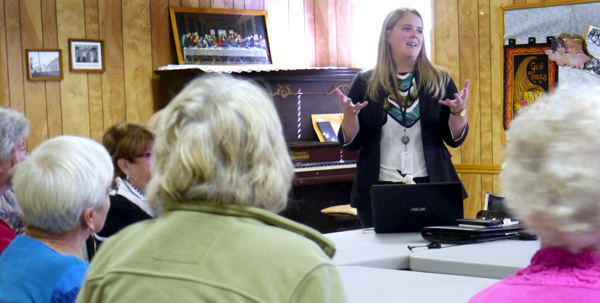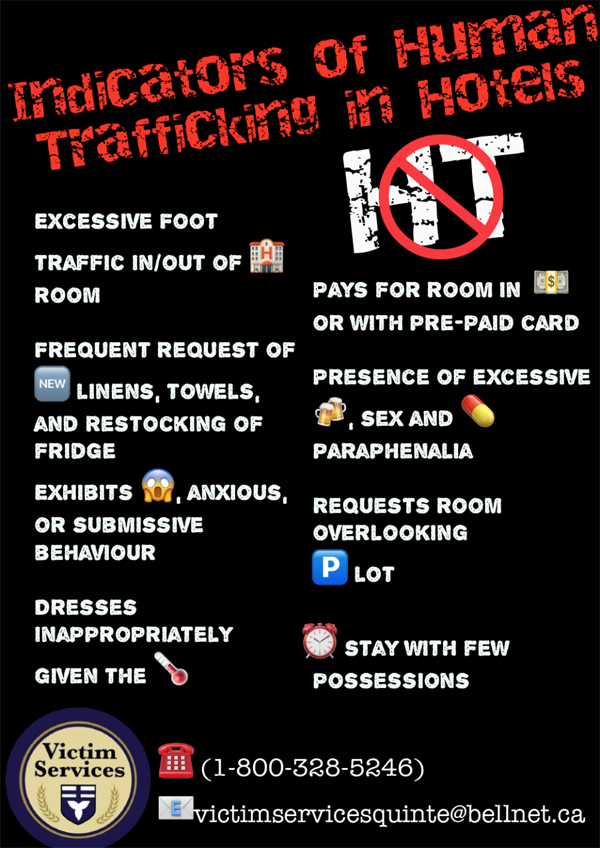Victim Services educates local accommodations in Human Trafficking campaign
Administrator | Sep 12, 2017 | Comments 0

Victim Services representative Hana Enright addressed the Consecon Women’s Institute members. -Sharon Harrison photo
By Sharon Harrison
Often thought of as a problem that exists elsewhere in big cities or in other countries, human trafficking isn’t generally considered a concern affecting Prince Edward County, but its proximity to Highway 401 and the major centres of Toronto and Ottawa tell a different story.
Hana Enright, of Victim Services Hastings, Prince Edward Lennox & Addington, spoke with Consecon Women’s Institute members Friday about the many different forms of trafficking – drug, sex, labour and weapons – with a focus on human trafficking and its impact locally.
“We are along the 401 corridor and we have quite a long list of hotels and Airbnbs that people are attracting humans to for the purposes of human trafficking and sex,” said Enright. “What most people don’t know is that it has being going on for years, it’s not a new thing. Trafficking is an everyday occurrence and yes, it happens everywhere. Some people don’t want to believe it, but it certainly does.”
Enright explained there are two types of human trafficking – domestic and international trafficking.
“With international, the boys and girls have been flown to another country in order to perform the services that they are being forced into. With domestic, the trafficking is in the boundaries of your country and that’s want we want to raise awareness about,” said Enright.
The international definition of human trafficking, “in persons is the recruitment, transportation, transfer or receipt of persons for coercion, which means threats, force, fraud, abuse of power or payment in the exchange of consent of a person having control over another person for the purposes of exploitation,” explained Enright.
As part of its human trafficking campaign, Victim Services is visiting local hotels, motels and Airbnbs to educate and train people on how to recognize human trafficking.
They have created a poster for accommodation providers which shows hotel staff what to look for. An example may be a young girl who is dressed provocatively who arrives with two older men. Hotel staff are taught how to recognize the signs, question the relationship and to look for red flags such as bruising, injuries and inappropriate clothing for the weather conditions. Also, there may be constant requests for fresh linens and towels and the room always declines the cleaning service. There may also be drug or sex paraphernalia found in the room.
Enright also noted tattoos in invisible places which she called “branding”.
“These traffickers will have their logo, and sometimes it’s their name, they are branding their women like you would brand cattle. They tattoo all of them in the same place whether it’s their neck, lower back, sometimes on the leg. They brand these girls and it’s to show other traffickers on the street that ‘this is my property’.”
“Unfortunately, a lot of the times these girls will be forced to stay in these hotel rooms with no phones, no money, maybe a change of clothes, and the traffickers will often be in another hotel room sending the services to the girls’ room. They don’t know who is showing up, they don’t know who is rapping at the door. They have full control over who they see, money, what they eat. It’s a huge control method.
“It’s the victims that we are seeing at our site, the thing that they are suffering from the most, they have been trafficked by another person and forced into doing things they don’t want to do,” Enright said, adding, “The business of human trafficking consists of three levels especially in sex trafficking: there’s the traffickers and the absolute top of the food chain, then we have the john’s (a john is somebody who pays for sex), the john’s go on these websites and are looking for these services, and at the very lowest level is the victim, the person who is being coerced into these nasty behaviours.”
Enright talked about vulnerabilities of the girls and why they allow themselves to be coerced into this trade.
“There are so many barriers and it starts with the individual ones, the individual’s personal drive. It sounds simple: don’t do it, but it’s not as simple as that. There are many layers that we work through with these girls, so it is very much a business and unfortunately the victims are on the very lowest of the chain.”
The most vulnerable age according to Canadian statistics is between 10 and 17. Locally, victims, usually girls, but they see boys too, are often high school age and can be as young as 12 or 13, up to about age 25.
“There are behavioural traits and intellectual traits that could make somebody vulnerable to being trafficked by the powerful older male, such as poor school success, they aren’t doing so well, they start skipping class, they start to hang out with other kids in another class. Also, inadequate social skills, they are more of an introvert and keep to themselves and go off by themselves quite a bit and are always on the internet and if they’ve had past sexual abuse in the home and maybe have a skewed vision or understanding of what sex is, that could potentially make them more vulnerable. If the child has experienced a lot of neglect, physical abuse in the home, addiction at a young age and if they are involved in the child welfare system in group homes and they feel as if they just don’t belong,” said Enright.
Enright noted 64 per cent of women involved in sex trafficking have been in the child welfare system as children.
Traffickers, she said, can be anybody and they can be very jealous, controlling and violent.
“They can be large, organized crime groups, some of them can be very dangerous people. They can be parents or family members, whatever the case may be – a broken down family, maybe a family member has a severe addiction issue and needs funds to beat his addiction. It could be small groups of people operating a criminal operation, or a young group of kids. It can basically be anywhere and it doesn’t have to be the big cities or big corporations, the big crime groups. It can happen in just your groups of friends, you just never know. Or, it could just be an opportunistic individual. It could be anybody and I think that’s the scary part,” said Enright.
On average, one female could potentially bring in about $80,000 a year for a trafficker — the victim receives nothing from the transaction.
Enright also explained the role of Victim Services in communities and provided background and insightful information on services available – including 24/7 crisis support with trained volunteers on call at all times.
With offices in Belleville, Napanee and Quinte West, Victim Services covers a wide area throughout Hastings, Prince Edward and Lennox & Addington counties. It offers a broad range of confidential and free services and programs to victims and family members covering sexual assault, elder abuse, sudden death, abduction, hate crimes and homicide among them.
“Many people haven’t heard of Victim Services or are unaware of exactly what they do,” said Enright. “People don’t know about our services until they need us.”
Victim Services’ Quick Response Program means funding is immediate and victims are helped quickly.
“The quick part is crucial, but that’s not to say these victims are on our caseload for a day and we ship them off and let them go. We spend months and months working with these victims especially if they are still living in our area. We build a rapport with them. They have had very little trust in their lives for the past year, however long they have been involved in that, so they build this trust with you because finally someone is putting them in the driver’s seat. I’m saying ‘this is what I can do for you and you tell me what you want’, so it is a really cool working relationship with these victims, but it’s not to say it isn’t hard. They have been put through a lot, but we are there to help them and to focus on them and they haven’t really had the focus on them too terribly much.”
Victim Services is the only agency in the Quinte region providing immediate on-site crisis, trauma, safety and support services to victims of crime and sudden tragedies.
For more information about Victim Services, visit victimservicesquinte.ca or call 1-866-680-9972.

Filed Under: Arts & Culture • Featured Articles • Local News
About the Author:


































